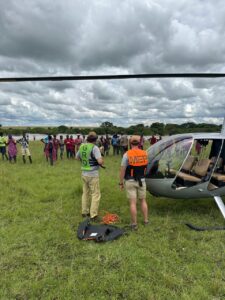The rapid and global spread of the COVID-19 virus has brought with it challenging future implications for conservation, particularly elephant conservation in Kenya. However, Mara Elephant Project, as first responders, have carried on safely in the field and the two Sheldrick Wildlife Trust (SWT) Mau De-Snaring Unit teams are no exception. We continue to be deeply concerned about the socio-economic downturn and what that means for the communities we work so closely with to protect Kenya’s iconic elephants and the Mara ecosystem. As a result, we have seen an increase in bushmeat poaching and illegal habitat destruction activities, which makes the SWT Mau De-Snaring Unit team’s efforts all that more important during this time of uncertainty.
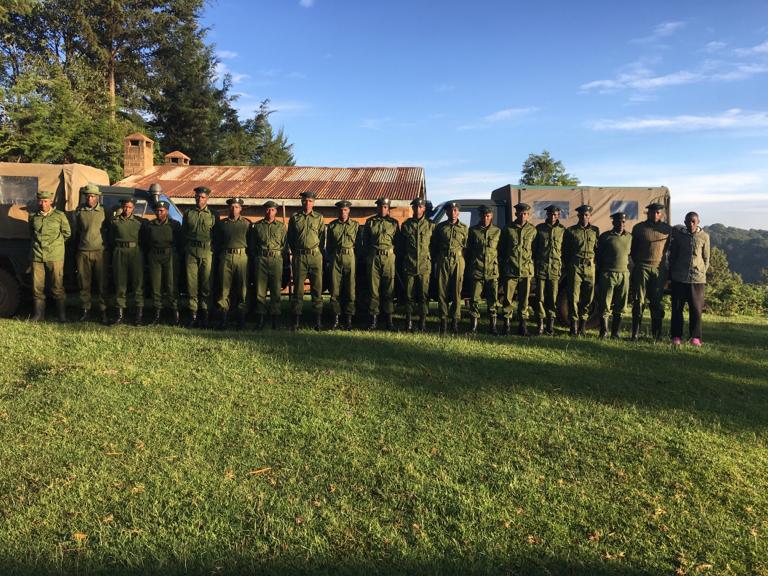
All SWT Mau De-Snaring Unit team members photographed in January 2020.
The original SWT Mau De-Snaring team “Echo” includes seven rangers and the new team “Golf” that was deployed in December 2019 has nine new recruits totaling 16 SWT rangers in the field covering the Mau Forest. The SWT Mau De-Snaring Unit teams were busy over the first half of 2020 focusing on habitat destruction activities in the forest and, with the effect of COVID, an increase in bushmeat poaching.
In total, the teams (from January – June) destroyed 40 kilns, 74 bags of charcoal and seized a total of 1,792 total illegally logged timbers (500), logs (58) and posts (1,234), three power saws and arrested 48 total suspects; 30 for illegal logging activities and 18 for charcoal production or transportation activities. In terms of poaching, the teams removed a total of 92 snares, seized one antelope skin, one bow and three arrows, 5 kg of bushmeat, destroyed two poacher’s camps and arrested five suspects for bushmeat poaching.
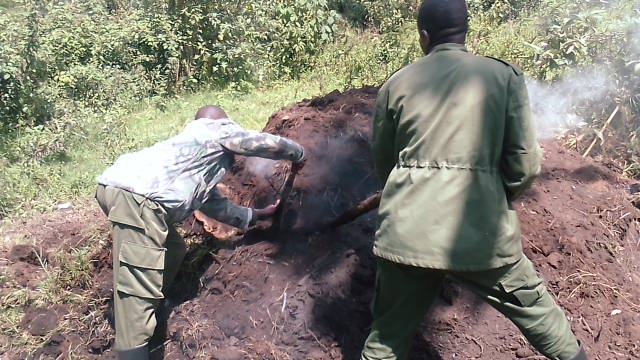
A kiln destroyed by the SWT Mau De-Snaring Unit in January.
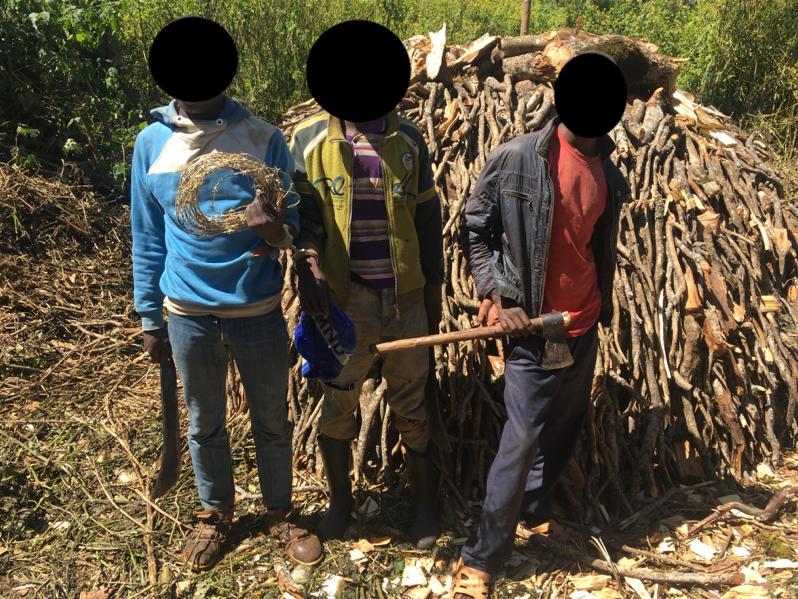
SWT Mau team arrested three suspects in Kericho Forest in February.
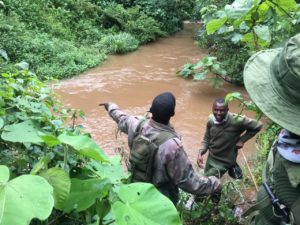 In April, the teams, like many in the Mara, were affected by record flooding and were unable to cross many rivers that are normally streams. The Mara saw a historic level of rain in the second quarter, which made patrolling in the Mau Forest challenging. While both teams were still operational, many streams became rivers and it made foot and vehicle patrols slow. Though the rains made patrolling challenging, the teams did engage with Kenya Forest Service (KFS) to plant indigenous trees in the Emitik area; an area heavily hit by deforestation. The reclaimed areas of the Mau Forest from 2019 are recovering extremely fast due to the large amount of rain. Unfortunately, also due to the rain, there were some landslides as the reclaimed areas are still recovering from the loss of tree cover and intense farming. We distributed 800 kg of Dombeya and Cedar seed balls on land slides in the Mau from Seedballs Kenya.
In April, the teams, like many in the Mara, were affected by record flooding and were unable to cross many rivers that are normally streams. The Mara saw a historic level of rain in the second quarter, which made patrolling in the Mau Forest challenging. While both teams were still operational, many streams became rivers and it made foot and vehicle patrols slow. Though the rains made patrolling challenging, the teams did engage with Kenya Forest Service (KFS) to plant indigenous trees in the Emitik area; an area heavily hit by deforestation. The reclaimed areas of the Mau Forest from 2019 are recovering extremely fast due to the large amount of rain. Unfortunately, also due to the rain, there were some landslides as the reclaimed areas are still recovering from the loss of tree cover and intense farming. We distributed 800 kg of Dombeya and Cedar seed balls on land slides in the Mau from Seedballs Kenya.
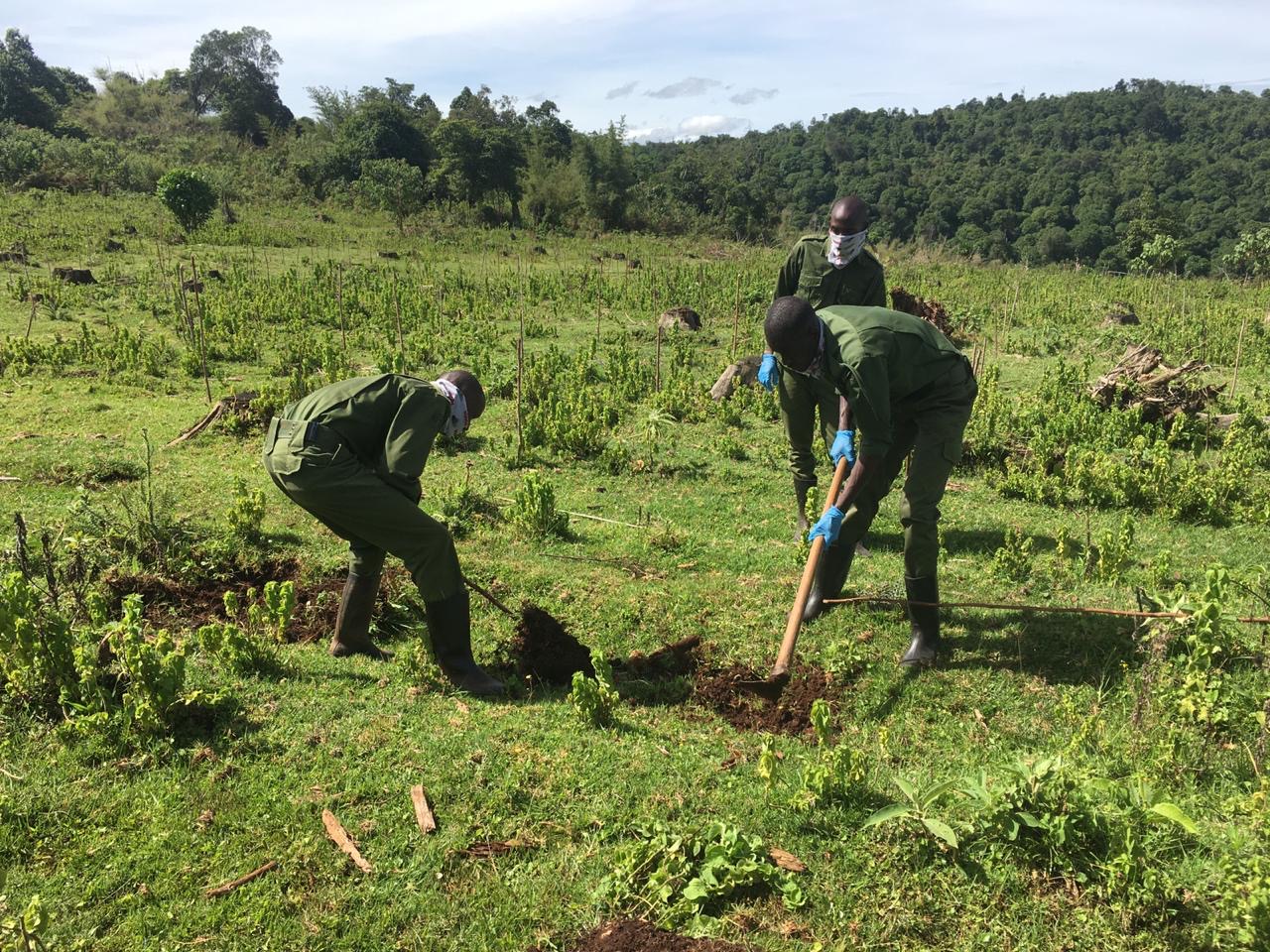
Team members readying land for planting in the Mau.
The partnership model MEP promotes became crucial during the pandemic. In May, the SWT Mau De-Snaring Unit partnered with not only KFS but also the Bongo Surveillance Project on joint patrols with great success. The SWT Mau De-Snaring Units were mainly focused on shutting down illegal activities related to habitat destruction and poaching. There was only one incident of conflict mitigation during this reporting period. It occurred on January 6 in the Kericho area of the Mau Forest. The team responded with firecrackers when elephants were raiding beans.
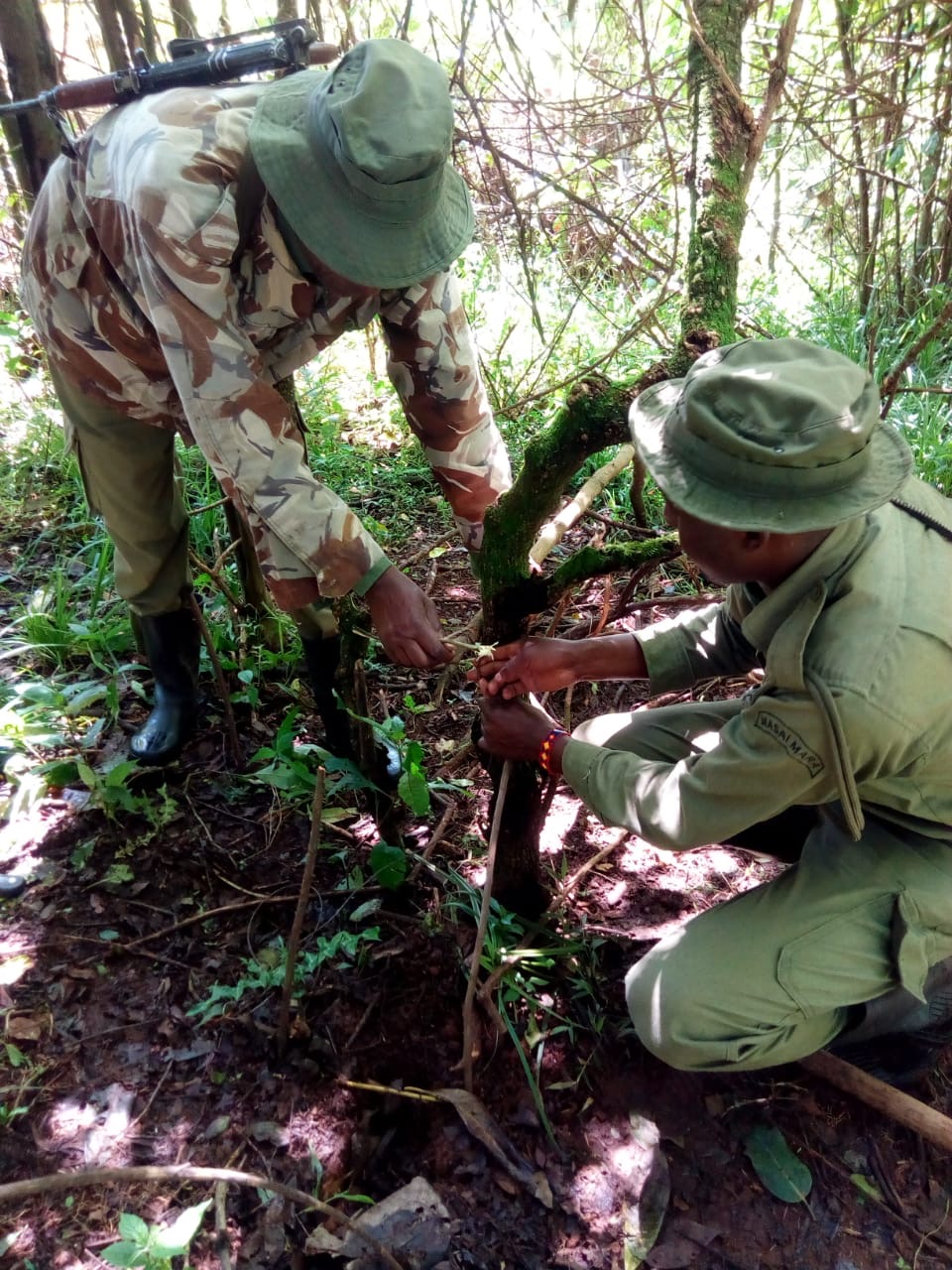
Snares being removed in the Mau Forest.
Additionally, the pandemic brought about challenges for all patrol groups operating in the field and personal protective equipment, or PPE, and proper hand washing stations became vital to ensuring we can do this essential work safely. On May 8, the SWT Mau De-Snaring Unit supported our partners KFS by delivering PPE along with materials for mobile hand washing stations to the KFS ranger posts around the Mau Forest. The distribution included nine super drum containers, 15 liters of hand sanitizer, nine spray bottles and 100 face masks.
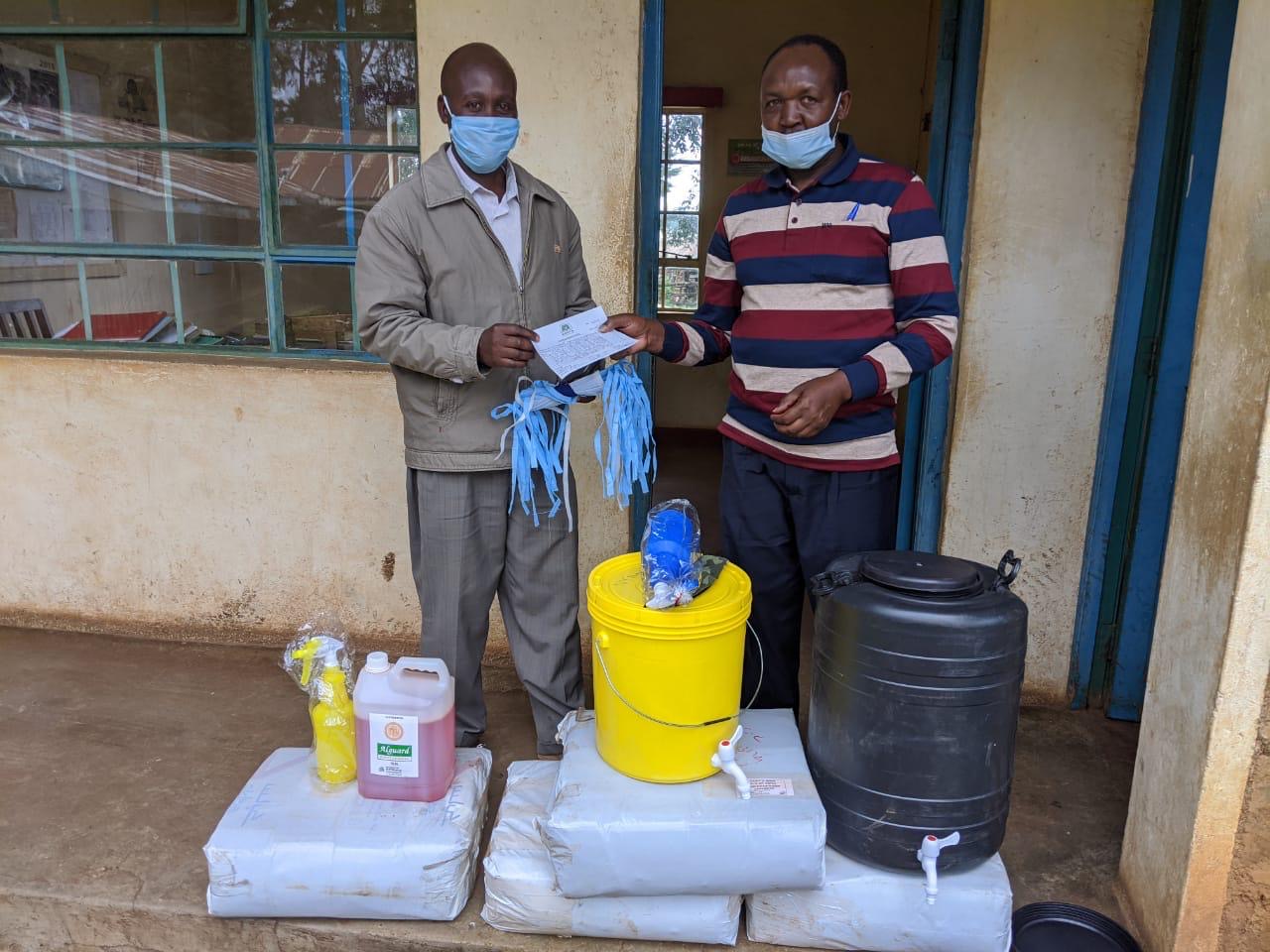
KFS accepting the donation from MEP.
In April and May, the Karen Blixen Camp Trust helicopter was used for reconnaissance flights. In April, an evening reconnaissance flight in the Mau Forest marked any illegal logging or charcoal production sites; monitor any possible incursions into the reclaimed areas; meet up with our SWT Mau team to deliver masks; and to speak to the KFS forester at Olenguruone forest station.
The rapid spread of the highly infectious COVID-19 virus brought about many challenges for the two SWT Mau De-Snaring Units. They had to follow new protocols that required them to work in isolation, wear masks, maintain the recommended 6-foot distance and properly wash their hands all while addressing a rise in illegal activities in the forest. These two teams managed to carry on under the great pressures that virus put on the Mara. Additionally, with the downfall in the economy due to halt of tourism in the Mara, MEP’s on-the-ground ranger presence was more important than ever as first responders. In the next six months, MEP plans to continue to conduct more patrols with the BSP team and deploy 5 GSM enabled trap cameras with support from the Eden Wildlife Trust.
